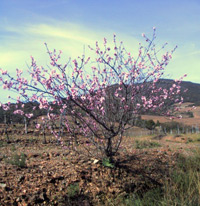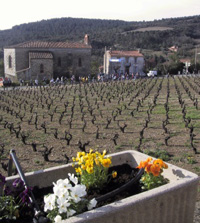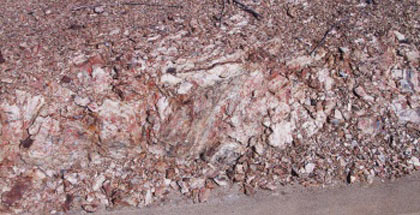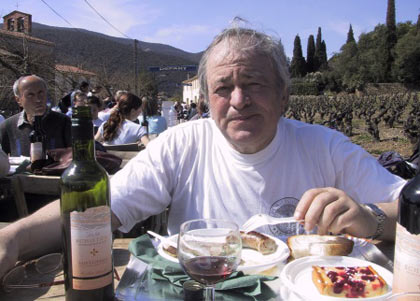The wine village of Berlou is almost on the Mediterranean, a good 50 kilometres from the beach, at the foot of the foothills of the "Haut Languedoc". Despite the Mediterranean climate, spring has been a long time coming this year. The market woman apologises: the few flowers on the table are just the first free-grown signs of spring.
In the agenda of "Terre de Vin" I discover an advertisement: "Printemps de Berlou, randonnée V.T.T, dégustation, repas campagnard, marché de terroir...".

|
|
Spring Awakening in Berlou
|
"Randonnée", that is a long walk, a hiking tour.... it can also be a ski tour. But at this time of year, near the Mediterranean, hardly! I don't know the abbreviation V.T.T, but I interpret it as "vin,
terroire, touristique" or something similar. Given the
French penchant for abbreviations, the three letters don't faze me. I imagine a wine association, a rural community of
winegrowers and winemakers, people who speak a dialect they themselves describe as "stony" (rocailleux).
On Sunday morning, when we are directed to a car park in the vineyards a kilometre before Berlou, the thought arises for the
first time that perhaps my knowledge of
French is not quite so good after all and that a "randonnée" could also be something completely different. In the car park, "bikes" are loaded out of the cars and the place turns into a big open-air dressing room where (almost) everyone squeezes into shiny, tight dresses. Soon there is no longer any doubt: it's off on
mountain bikes through the vineyards. I still don't know what is abbreviated by the letters V.T.T.: but it must not be a winegrowers' association but a sports association.
With the help of a woman at the "Inscription" - where the number 1147 is already issued - we solve our problem: we don't have any bicycles, not even a walking stick.

|
|
Start of the Randonnée
|
But the smallest tour - intended for the "little ones" - is "only" 8 kilometres long, leads through more or less flat
terrain and is easy to walk. So we set off. We have dispensed with the back number. It turned out to be a long but wonderful walk. Black vines as far as the eye could see. The
first violets and flowering almond bushes. Small paths, full of chunks of slate, gravel and sharp stones. Whenever it is relatively flat, "the little ones" whiz past us. If it is uphill and downhill: then we better flee into the next ditch, otherwise it will be dangerous.
The trail turns into a unique, instructive vineyard tour for us. It is only now that I really understand what is behind the term "structural change" in viticulture. One third of the
winegrowers will not survive economically, we are told, and we read daily in the newspapers about the
bitter struggle for livelihoods.

|
|
Typical rock of the von Berlou
|
But the 500 hectares of cultivated land in the "village area" of Berlou consist exclusively of vines, mainly old vines, well tended. We encounter only one overgrown plot on the long walk. We immediately suspect: inheritance disputes.
Hardly anything else can grow here but vines, a few olive trees and barren
garrigue, there are no meadows, only "stone deserts" and a little forest at higher altitudes.
Three hours later, back in the
village, lunch outside with the aromatic sausages for which the hinterland is famous. Everything is nicely arranged on plastic plates with plastic utensils. Only for the wine, there are glasses and half a litre of "Schisteil" (with
screw cap) per person from the cooperative cellar.

|
|
The author at the "Schisteil
|
This "Schisteil" of Berlou is famous, you could find it on almost all the better wine lists in the area just 10 years ago. The cooperative of Berlou is one of the best in the
Languedoc and is a model company of the 20 communes of the
Saint-Chinian appellation. But even this model enterprise is struggling more than ever for market share and thus for the survival of the almost 90 associated winegrowing enterprises. Cooperative wines are - often wrongly - no longer in vogue. Individuality, lone fighters are in demand, self-pressers who try to extract as much individuality and quality as possible from the soil. But the "Schisteil" 2005 offered for the meal is a "cooperative wine", still very young, typical for the region, indeed for the place. Unmistakable, a slate wine: on the nose - horse stable I notice, but my wife thinks - a whole herd of goats. But the wine is fresh, harmonious, fruity, even fleshy.
In the evening, at home, I take an older, "ripe" "Schisteil" from Berlou, vintage 2002, out of the cellar. I bought it in Berlou about two years ago together with forum friends Michael and Maja, but have since forgotten all about it. The "Spring of Berlou" brought it into the glass: no horse stable and no goat stable, but a traditional
Saint-Chinian, deep-coloured, powerful, sun-drenched, without frippery and wood components, the wine snob talks about "terroir". For me, it is simply the wonderful product of people from a barren region, a landscape, a culture that I like and that I can encounter in wine.
Sincerely
Yours
Peter (Züllig)



